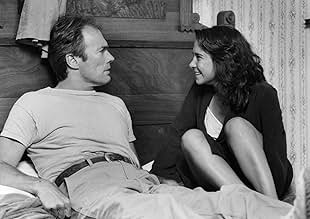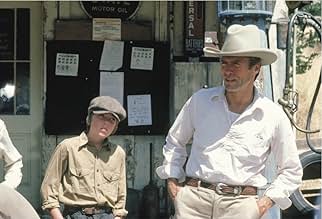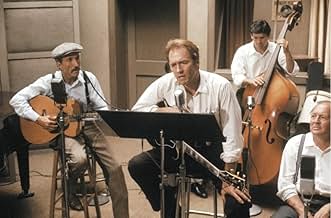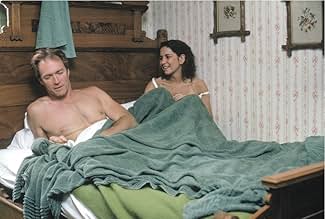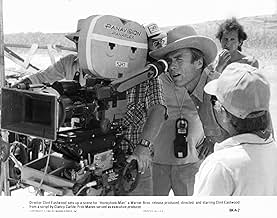A boy with a music talent goes on a journey with his uncle for a stage concert.A boy with a music talent goes on a journey with his uncle for a stage concert.A boy with a music talent goes on a journey with his uncle for a stage concert.
- Awards
- 1 nomination total
- Director
- Writer
- All cast & crew
- Production, box office & more at IMDbPro
6.610K
1
2
3
4
5
6
7
8
9
10
Featured reviews
minor classic
Despite almost every critic I've read, I think this is a real gem by Clint Eastwood. A honest, sensitive effort in the road movie tradition. The minor tone, the naive sequences soothe Red Stovall's journey to his fate. The movie also displays a touching view of the depression era in USA. Like animated Roy Emerson Stryker's pictures the photography is remarkable as well as the sound track. I've learned about lots of singers and musicians that recorded only to give a final testimony of their art. I guess stories like these deserved a movie like Honkytonk Man. Long life to Clint, one of the most underrated talents not only in Hollywood but in the rest of the world.
Don't get too cozy.
An under appreciated 80s effort (being Eastwood's ninth stint directing a major feature), which rarely gets a mention and if so it mainly gets a "meh". This Clint Eastwood directed/performed feature 'Honkytonk Man' shows much more a vulnerable Eastwood in a very dramatic role (of an aging, alcoholic drifting country singer) that asked a lot from him. Set during the period of the great depression that ravaged the 1930s, Eastwood manages to capture the authentic atmosphere and dusty locations of the times with Bruce Surtees's earthy photography and his very-grounded direction, but also letting the harshness move over for some very sentimental openings that never manipulate the situations. There's a real homegrown feel, mixing elements of a coming of age story to someone longing to be somebody and this is all coming together to learn not to take everything on face-value. We watch two people, fulfilling a dream as it ignites the passion leaving to a series of adventures and an insightful script exploring the interactions.
It's an inspired turn by Eastwood, but his son Kyle Eastwood is just as impressive in a sincerely down-to-earth performance as the young lad Whit, the 14 year old nephew that makes sure that he gets his uncle to the Gran Ole Opry stage to do his thing albeit trying to keep him sober to perform. Along for the journey you'll find the likes of John McIntire, Alexa Kenin, Tim Thomerson, Barry Corbin, Macon McCalman, Joe Regalbuto and Charles Cyphers making up a splendidly admirable cast. A very heart-warming Verna Bloom and sturdy Matt Clark do leave their marks as Whit's worrying parents. While rather long, the chemistry makes sure the story marvelously flows and the relax temperament lets the emotional factor seep in. I don't know, but I found it hard not to like. The score is a perfectly delightful country twang featuring numerous names in Marty Robbins, Frizzel and West, Ray Price, Linda Hopkins and supervised by Snuff Garrett. Let's not forget Eastwood himself adding to the arrangement.
A wonderfully brassy and enterprising Eastwood fable.
It's an inspired turn by Eastwood, but his son Kyle Eastwood is just as impressive in a sincerely down-to-earth performance as the young lad Whit, the 14 year old nephew that makes sure that he gets his uncle to the Gran Ole Opry stage to do his thing albeit trying to keep him sober to perform. Along for the journey you'll find the likes of John McIntire, Alexa Kenin, Tim Thomerson, Barry Corbin, Macon McCalman, Joe Regalbuto and Charles Cyphers making up a splendidly admirable cast. A very heart-warming Verna Bloom and sturdy Matt Clark do leave their marks as Whit's worrying parents. While rather long, the chemistry makes sure the story marvelously flows and the relax temperament lets the emotional factor seep in. I don't know, but I found it hard not to like. The score is a perfectly delightful country twang featuring numerous names in Marty Robbins, Frizzel and West, Ray Price, Linda Hopkins and supervised by Snuff Garrett. Let's not forget Eastwood himself adding to the arrangement.
A wonderfully brassy and enterprising Eastwood fable.
Heading For The Promise Land
Set in Depression era Oklahoma, this film tells the story of a dirt poor, alcoholic singer named Red Stovall (Clint Eastwood), who heads out for Nashville, in hopes of making it big as a country singer. The story begins on a dilapidated farm composed mostly of dust, where Red's sister hesitatingly allows her son Whit (Kyle Eastwood) to go with Red to Nashville. The kid's Grandpa (John McIntire) also wants to go, to return to his native Tennessee. The film's beginning is dreary and depressing, but wonderfully realistic of the dust bowl days of the 1930s.
Much of the plot takes place on the road, as the three travelers encounter an assortment of characters and problems along the way. The most important character they meet is a young girl named Marlene (the late Alexa Kenin), who yearns to be a country singer. It's one of many plot contrivances, but at least this contrivance offers some humor, especially when Marlene ... "sings". Other plot contrivances include a jailbreak, an angry bull, an aborted robbery, and an incident involving a chicken coop.
If the film's weakness is excess contrivances, the film's strength is the portrayal of Red as an interestingly complex character. He coughs a lot, a symptom of tuberculosis. And the TB is getting worse. The question is ... will Red be able to reach the promise land before the disease affects his ability to sing? And, in a long monologue aimed at Whit, Red talks about his long-ago love affair with Mary Sims.
The film's acting is credible, if not outstanding. Kyle Eastwood does a nice job as Whit. The film also features cameos by several then-current country singers. At the end, there's some sad real-life irony as Marty Robbins helps Red.
"Honkytonk Man" has some good atmosphere. Arguably, the best segment is at the Top Hat Club on Beale Street in Memphis, where the great Linda Hopkins belts out a blues number. If the film's writer had ditched some of those hokey "on the road" contrivances, and focused the plot more in smoky old bar rooms with low light levels and mournful music, the film would have been a lot better. As is, "Honkytonk Man" is still worth a look, if for no other reason than to see a low-key character study, in contrast to the brash and gaudy big ticket films of that cinematic era, like "Raiders Of The Lost Ark" and "Star Wars".
Much of the plot takes place on the road, as the three travelers encounter an assortment of characters and problems along the way. The most important character they meet is a young girl named Marlene (the late Alexa Kenin), who yearns to be a country singer. It's one of many plot contrivances, but at least this contrivance offers some humor, especially when Marlene ... "sings". Other plot contrivances include a jailbreak, an angry bull, an aborted robbery, and an incident involving a chicken coop.
If the film's weakness is excess contrivances, the film's strength is the portrayal of Red as an interestingly complex character. He coughs a lot, a symptom of tuberculosis. And the TB is getting worse. The question is ... will Red be able to reach the promise land before the disease affects his ability to sing? And, in a long monologue aimed at Whit, Red talks about his long-ago love affair with Mary Sims.
The film's acting is credible, if not outstanding. Kyle Eastwood does a nice job as Whit. The film also features cameos by several then-current country singers. At the end, there's some sad real-life irony as Marty Robbins helps Red.
"Honkytonk Man" has some good atmosphere. Arguably, the best segment is at the Top Hat Club on Beale Street in Memphis, where the great Linda Hopkins belts out a blues number. If the film's writer had ditched some of those hokey "on the road" contrivances, and focused the plot more in smoky old bar rooms with low light levels and mournful music, the film would have been a lot better. As is, "Honkytonk Man" is still worth a look, if for no other reason than to see a low-key character study, in contrast to the brash and gaudy big ticket films of that cinematic era, like "Raiders Of The Lost Ark" and "Star Wars".
Anti hero.
It took a lot of nerve in the early eighties,in the days of Rocky,Indiana Jones and "fame" to portray such a human wreck.Eastwood's character recalls Hank Williams,one of the few country singers whose songs experimented tragedy ("I'll never get out of this world alive"). The difference lies in the fact that the singer here will remain an obscure artist.
A road movie,it features an interesting boy character who learns the harsh realities of life.In the short space of a couple of days,he will have experimented love (first in a brothel,then probably later with the girl they met along the road) and death (he'll have to cope with a burial).The young female "singer" they -reluctantly-take with them provides the movie with the comic relief it does need:you should hear her sing "My bonnie" in a shrill voice.
The ballads Eastwood sings are moving and tuneful(I don't know if he is dubbed for them,but anyway it's made with taste and respect for the audience).The audition is the highlight of the movie,Eastwood seems to sing as if it were a matter of life and death(and it is anyway).The actor/director avoids pathos and melodrama.Once again,it was a very risky move to play such a character at a time when success story was the golden rule.The movie was bound to be a flop,but it deserves to be restored to favor now.
A road movie,it features an interesting boy character who learns the harsh realities of life.In the short space of a couple of days,he will have experimented love (first in a brothel,then probably later with the girl they met along the road) and death (he'll have to cope with a burial).The young female "singer" they -reluctantly-take with them provides the movie with the comic relief it does need:you should hear her sing "My bonnie" in a shrill voice.
The ballads Eastwood sings are moving and tuneful(I don't know if he is dubbed for them,but anyway it's made with taste and respect for the audience).The audition is the highlight of the movie,Eastwood seems to sing as if it were a matter of life and death(and it is anyway).The actor/director avoids pathos and melodrama.Once again,it was a very risky move to play such a character at a time when success story was the golden rule.The movie was bound to be a flop,but it deserves to be restored to favor now.
Put Your Arms Around This Honky Tonk Man
One of Clint Eastwood's more personal projects is Honkytonk Man where he both gets to do some singing and also to work with his then adolescent son Kyle. Apparently Kyle Eastwood has inherited the musical part of the Eastwood genes because he makes his living now as a jazz musician. I wonder if he ever jams with Woody Allen?
Clint did not exactly set the world on fire in his previous musical outing in Paint Your Wagon. But in Honky Tonk Man he's right in his element as a hard living country singer during the Depression trying to finally catch a break with the Grand Ole Opry.
Arriving at his sister's farm, Clint picks up both Kyle who is playing his nephew here and John McIntire who is Kyle's grandfather on his father's side and the three generations start out from Oklahoma to Nashville.
Eastwood has played some hard bitten characters in his films, but never one as dissolute as Red Stovall. His high living has brought him a case of tuberculosis, a lot more common and a lot less curable back in those days. In any event the peace and quiet of a sanitarium holds no interest for Clint. He'd rather go out drinking and wenching than die of boredom in a sanitarium.
Of course the odyssey of the three bring any number of adventures about life and love in their lives.
John McIntire fits right in with the father and son Eastwoods. Also look for good performances by blues singer Linda Hopkins, young Alexa Kenan who hitches a ride with the travelers, and a cheating Barry Corbin who Clint collects from in the usual Eastwood manner. All and all a nice family project from the clan Eastwood.
Clint did not exactly set the world on fire in his previous musical outing in Paint Your Wagon. But in Honky Tonk Man he's right in his element as a hard living country singer during the Depression trying to finally catch a break with the Grand Ole Opry.
Arriving at his sister's farm, Clint picks up both Kyle who is playing his nephew here and John McIntire who is Kyle's grandfather on his father's side and the three generations start out from Oklahoma to Nashville.
Eastwood has played some hard bitten characters in his films, but never one as dissolute as Red Stovall. His high living has brought him a case of tuberculosis, a lot more common and a lot less curable back in those days. In any event the peace and quiet of a sanitarium holds no interest for Clint. He'd rather go out drinking and wenching than die of boredom in a sanitarium.
Of course the odyssey of the three bring any number of adventures about life and love in their lives.
John McIntire fits right in with the father and son Eastwoods. Also look for good performances by blues singer Linda Hopkins, young Alexa Kenan who hitches a ride with the travelers, and a cheating Barry Corbin who Clint collects from in the usual Eastwood manner. All and all a nice family project from the clan Eastwood.
Did you know
- TriviaThe script originally called for Whit (Kyle Eastwood) to get high from smoking marijuana, but Clint Eastwood, who is very anti-drug, refused, even with Kyle using a prop cigarette. Eastwood finally relented to his son's character getting high from a contact buzz.
- GoofsRyman Auditorium is used as the setting for the Opry. This venue was not used until the 1940s, and the movie takes place in the 1930s.
- Alternate versionsABC edited 7 minutes from this film for its 1986 network television premiere.
- ConnectionsFeatured in At the Movies: Dueling Critics (1983)
- SoundtracksHonkytonk Man
Sung by Marty Robbins and Clint Eastwood
- How long is Honkytonk Man?Powered by Alexa
Details
- Release date
- Country of origin
- Language
- Also known as
- El aventurero de medianoche
- Filming locations
- Fallon, Nevada, USA(scene with bull)
- Production company
- See more company credits at IMDbPro
Box office
- Budget
- $2,000,000 (estimated)
- Gross US & Canada
- $4,484,991
- Opening weekend US & Canada
- $667,727
- Dec 19, 1982
- Gross worldwide
- $4,484,991
- Runtime
- 2h 2m(122 min)
- Sound mix
- Aspect ratio
- 1.85 : 1
Contribute to this page
Suggest an edit or add missing content


